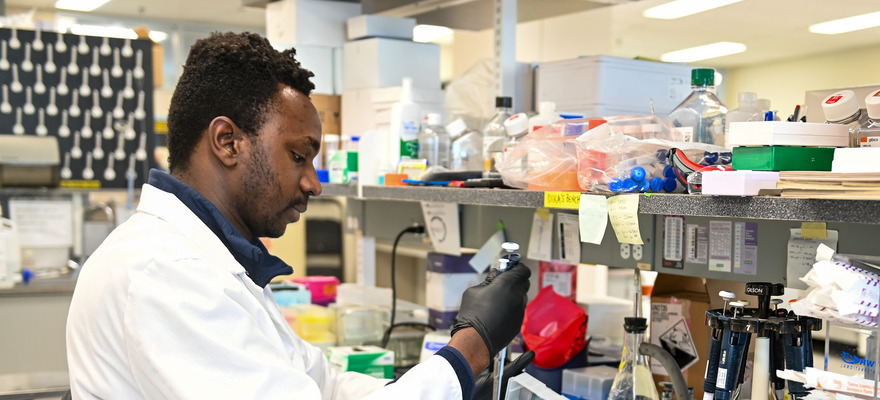Neuroscience student works to further Alzheimer’s research and diversify student voices at Western

By Noah Brennan
“Alzheimer’s is a disease about which we know very little.”
-Dika Ojiakor
When he was a child growing up, Onyedikachi (Dika) Ojiakor would often be found reading his parents’ books, motivated by a curiosity to learn something new.
Ojiakor is still learning. Now, at Robarts Research Institute at Schulich School of Medicine & Dentistry, he is working to unravel the mysteries surrounding neurodegenerative diseases, specifically, Alzheimer’s.
“Alzheimer’s is a disease about which we still know very little,” said Ojiakor, a neuroscience PhD Candidate.
For his thesis, Ojiakor is trying to identify the early changes that may occur in the brain of people with a high risk of developing Alzheimer’s. His research investigates how various integrated factors come together to set the brain down the path that might lead to the development of the disease.
“By the time you have a formal diagnosis, the disease has probably already progressed too much for anything helpful to be done,” he said. “A lot of the pathological changes that lead to the development of the symptoms that get diagnosed as Alzheimer’s occur long before diagnosis happens.”
Developing an understanding of the early pathology of Alzheimer’s could allow for interventions to mitigate the progression of the disease.
Now in the final year of his PhD, Ojiakor is hopeful for the future of Alzheimer’s research and confident in his contributions to the global effort to understand the disease.

Compelled by curiosity
Ojiakor is still driven by an innate curiosity about the subjects he finds the most difficult to comprehend.
When he initially encountered neuroscience in an undergraduate physiology course, Ojiakor said he “didn’t do so hot.” The following summer, determined to learn what he didn’t know, he immersed himself in everything “neuroscience” and realized he found it particularly interesting.
Growing up in Nigeria, Ojiakor spent much of his childhood devouring the extensive reading material of his parents. Many young people would have put the books down out of confusion or boredom — not Ojiakor. He was fascinated and determined to understand their content.
“I really did not have any pastimes outside of reading books,” he said. “It piqued my interest in writing and the abundance of perspectives.”
That interest has led to new paths. Ojiakor was editor-in-chief of Schulich Medicine & Dentistry’s Dorsal Column , a quarterly publication founded by neuroscience graduate students to make their research accessible to a non-scientific audience. Ojiakor also served as the editor-in-chief of the Western Gazette’s Black History Month issue in 2018 and 2019.
Ojiakor said these editorial roles enabled him to provide a platform to as many diverse voices as possible.
“It is a little jarring to be in a class of 300 students and not see many Black faces,” he said. “It was very hard to find a space where Black students could build a community — where they could air their very specific challenges and their ideas on the Black experience.”
The Black History Month issue was a form of expression for those grievances and experiences, he said.
Although diversity on campus has improved since starting his undergraduate degree in 2014, Ojiakor said there are still challenges. He frequently uses the term “mental fortitude” when describing the experience of pursuing high-level research in neuroscience as a Black man.
His resilience in life is reflected in his persistence in the lab. Ojiakor said he is confident in what his work will do to further Alzheimer’s research.
“I feel hopeful,” he said.








